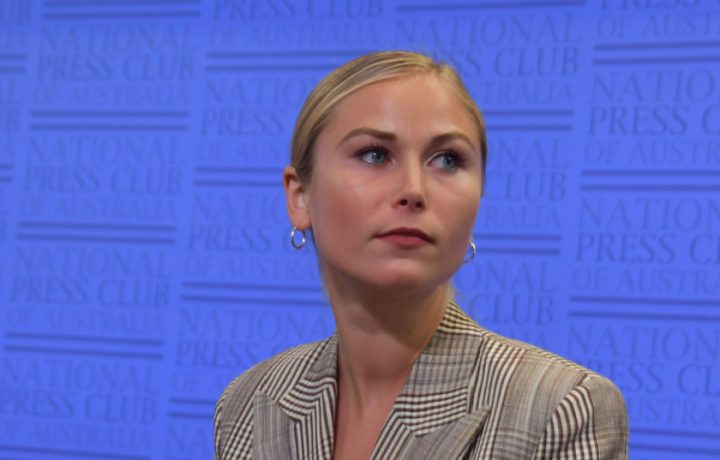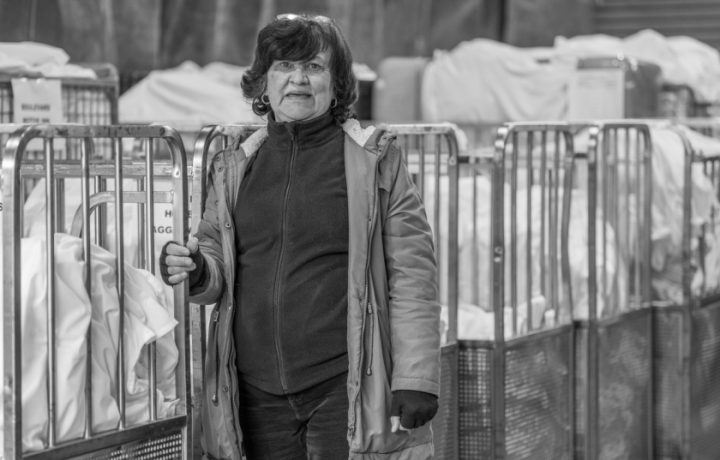The price they pay: Australia’s #metoo moment and the journalists at the helm

Posted on
“Let’s keep making noise Australia.”
Closing out her speech, 2021 Australian of the Year Grace Tame had spent over 20 minutes addressing the National Press Club. Between the awards ceremony in January, to the room full of journalists she stood before in March, Tame had become a household name; a voice that moved through the room and into rooms across the nation with ease.
Standing to their feet, many in the audience had tears in their eyes as they applauded Tame, steadying themselves in the wake of a vulnerable recount and plea that reached into the chasm of her pain in the name of reform, and of progress.
In a chair to Tame’s right sat Associate Editor of HerCanberra and Women in Media Canberra Convenor, Emma Macdonald. In step with her convening responsibilities, she moved to the podium to thank Tame and to address the journalists in the room.
Emma steadies herself and begins. But her speech wobbles, and an obvious upset claws its way into her words.
It was an upset that found her in the aftermath of Grace Tame’s speech and left her wanting to “literally curl into a ball”.
“It was so triggering, it was so deeply upsetting … I found it very hard to compose myself in the aftermath, much less continue speaking on live TV,” she says.
For Emma, and for countless other journalists like her, the nuance of storytelling in this context is one that is laced with difficulty. A transaction exists within this tension, and for female journalists, rests in the complexities of proximity – for every survivor, there is someone else.
That someone else is, tragically, often a friend or a sister, a colleague or the barista who serves you your regular or the lady opposite you in the waiting room or, heaven-forbid, you. Survivors are all around us. And, often, they are the storytellers who bring to us accounts that we resonate with, in a place that rests just left of the centre of our being.
The cost of this; the cost of exposing yourself to the gut-wrenching sadness and anger that comes from hearing these stories, to then seeing yourself represented, not in the shadows, but in the blinding light of their pain, to then reporting on it again – this cost cannot be underestimated.
And so exists the #metoo movement, and its ‘moment’ in Australia.
Nina Funnell, and her tireless work through the #LetHerSpeak campaign that saw Grace Tame to the Press Club podium; Samantha Maiden, in her breaking of the Brittany Higgins story; Louise Milligan, on the Christian Porter allegations; and Amy Remeikis, on herself.
Amy was also there on the day of Grace Tame’s speech. A political reporter for The Guardian Australia, she sat readying herself for the task of asking the political question of Tame, without the politics, a duality often demanded by the job.
But like others in the room, Amy knew all too well the cost of Tame’s exposé. For Amy has been nursing the wound of sexual assault for years: privately, in ways we will never know, but also publicly, as she felt a responsibility to lend her story to the movement over three years ago.
In a story titled: ‘A man raped me. Another tried to. They were not animals. They were men,’ Amy walked the public through two of her most harrowing moments in a tale told first in 2017, when #metoo landed in Australia, and again this year, when the movement found its feet again and ran.
For others, and for the movement, Amy took us to the shadows of her being. The cost of this has been weighty.
Despite having a solid support system and mechanisms in place to protect her in the aftermath of publishing her story, she treads mindfully around the weeks following due to the high-level trauma response she experienced.
“Even with all [of the] protections in place, I was still struggling.
“I didn’t sleep, I wasn’t eating, I was trying to respond to as many people as I could.
“I was constantly in fight or flight mode, and I was like that for months”.
Exposure to stories of this nature invoke a similar response in Emma. It took her months to recover from the visceral response she felt following Grace Tame’s Press Club address.
Woefully, this is a pattern that has repeated for her. When Virginia Tapscott, recipient of the Caroline Jones Women in Media award, published the heart-rending story of the loss of her sister to suicide following horrific childhood sexual abuse perpetrated against them both, Emma experienced very real distress.
Her involvement in Virginia’s decision to bring this story to the public meant she knew what was to come. But the day it made the front page of The Australian, Emma could not leave her bed.
“I found it very hard to function that day, I could barely stop the tears.”
“This is the effect these stories have on me, and I know I am not alone.”
And alone she is not.
In detailing the trauma response she experienced as a result of sharing her story, Amy turns to Grace Tame and Brittany Higgins, the household names that never should have been, and to the cost of continually being asked to carry the weight of our collective reckoning.
Samantha Maiden knows this keenly. As the Political Editor for news.com.au, Samantha was responsible for first breaking allegations, made by Brittany Higgins, of sexual assault that took place in Parliament House. It was a conversation that existed privately long before Grace Tame stood at the podium, but has carried on, with tremendous weight, in the many months that have followed.
“What Brittany Higgins has done is very brave and it has changed a lot of things, and there’s so many things to be proud of, but there is a huge human toll on her.
“It is all well and good for people to say that you have done amazing, but that doesn’t mean it is without its costs,” she adds.
At all levels, these costs are apparent and transient. From survivor, to journalist, they permeate, and they exist. Whether they render you to bed, or stop you from eating, or disconnect you from your family to the textbook trauma response invoked by seeing even a sliver of your story existing outwardly in someone else: the reality is that female journalists and survivors are often one and the same.
The cost of the movement exists at each level. It appears there is no balance – no technique to levelling the privilege with the burden, and the distress with the honour.
On this, Emma says that “it’s hard to tell the stories, and to talk about it, and to report on it.
“So many of us are carrying our own emotional load that we’re trying to process. And not all of us have the courage, or desire for whatever reason, to tell our stories publicly.”
“It’s been a very difficult time for so many women.”
There is no denying the frank brutality of exposure to this content for female storytellers who do remain so tethered to the pain and suffering.
Amy attests to the ongoing nature of this tethering, and the reality that “…if you’ve been through it, you’re not moving on from it.”
But there is hope too, she says. It is a hope that rests in those who are to come, that resides in the belief that the work being done now, with such personal sacrifice and tenacity, might prevent someone else from experiencing the same.
“I think that’s the main hope,” she says. “That if we can try and push for any sort of change, you’re saving someone else from ever going through what you went through.”
The #metoo movement is not done, not even close.
The foundations of this movement – originating with Tarana Burke and now resting in our hands, demand more.
There is a ladder that we climb in our pursuit of progress, each rung fastened by the stories shared, and strengthened by the zeal of those who have climbed it before.
For the women who are at the very top of this ladder; to the women who clutch the middle, and to the ones we are edging our way back down to get – there is nothing left to say but thank you.
#metoo.
IF YOU NEED SUPPORT
- Canberra Rape Crisis Centre: (02) 6247 2525
- 1800 RESPECT: 1800 737 732
- Lifeline: 131 114
- Beyond Blue: 1300 224 636

